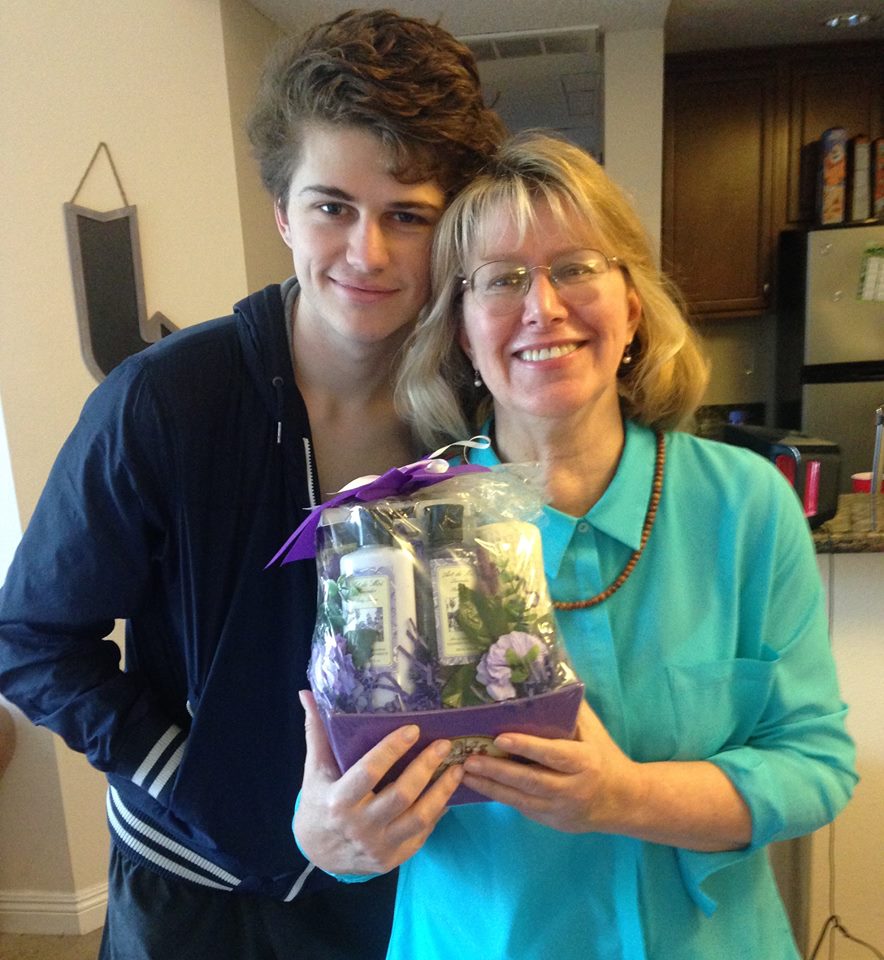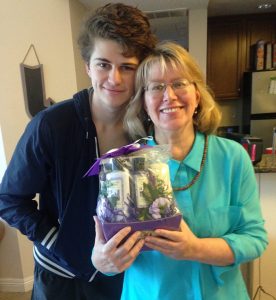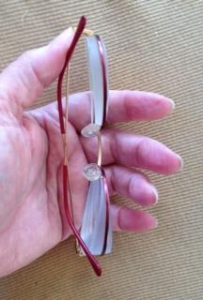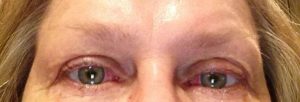
INTERVIEW: “At age 58 I can finally see properly for the first time ever. I am finally at peace.”
MICHAEL: Hello K! Who are you and where do you live now?
K: I was born in 1958 in the Cherokee Nation in the state of Arkansas. My ancestors were from the Eastern Band of Cherokees and migrated south from the Trail of Tears. I lived there from 1958-60 when we moved to Albuquerque, New Mexico, which is close to The Four Corners Area. I was adopted into a Hopi family from that region later. In 1966, my family moved to Oahu, Hawaii. My childhood and youth in Hawaii were pretty tough for various reasons. For one thing, where I lived, there were no other white people “haoles” around. For another, I suffered from, what I now know to be, sensory integration issues which manifested as autistic spectrum disorder. I used to feel like an outsider.
After graduating from the University of Hawaii in 1980, I moved to Santa Barbara, California. I came here to go to graduate school and have been here ever since. I am a licensed Marriage and Family Therapist. I specialize in doing psychotherapy with individuals, couples and families. I have two beautiful sons of whom I am very proud. I am also an active member of the Tibetan Buddhist community.
MICHAEL: How did your visual and neurological story begin?
K: I was born cross-eyed and mute. Over time it became clear I had more elaborate sensory integration issues, and much later I was diagnosed to be on the autistic spectrum.
MICHAEL: To be clear, mute means that you could hear but you couldn’t make any sounds, correct?
K: Exactly! I could not make any sound. When I cried no sound came out! My vocal chords were paralyzed until I was around six months old. To this day my voice wears out before the end of the day. I guess I will never be a singer! Ironically, I think this made my hearing very, very good. I can hear like a bat!
MICHAEL: I watched a video you recently posted on FB telling us about your garden and porch or, as you put it, your little slice of heaven. I did not notice anything unusual about your voice. Congratulations for having come so far towards making up for your vocal difficulties. It’s not easy to compensate for developmental delays like that, especially considering you also had other sensory and visual problems to deal with!
I think labored senses are a very important aspect of Autistic Spectrum Disorder. I think the tangled up sensory processing, sometimes feeling akin to a sensory assault, is much more of an explanation for autistic behavior than whether or not autistics have ‘concept of mind’. I think most people underestimate the effect of incoherent or unintegrated sensory input on functioning and behavior. People are not aware of how intruding sensory distortions can be!
K: Yes, Sensory Integration Disorder and Autistic Spectrum Disorder (ASD) go together! I’m not “autistic” as such. I’m on the “autistic spectrum,” it’s a very wide spectrum. I have light, sound and tactile sensitivities. For instance, I can hear fluorescent lighting to an almost deafening degree. Another example is feeling like getting burned or am caught in a hail storm when in the shower. I also have a myriad of visual problems and sensitivities. All of these peculiarities and their social implications made life very challenging. I felt like I didn’t belong. I just didn’t fit in. The wonderful thing about being older is that I now know all about ASD, and I have met lots of people through the internet that have it too! Understanding ASD has helped me to have more compassion with myself. I no longer feel like I have to apologize for not going to parties or not traveling.
MICHAEL: It is true that online groups are great for finding recognition and understanding from people who have had similar experiences. That has helped me a lot too. There is some good information out there now, albeit not universally known or accepted. I presume when you were young, even ‘specialists’ were very ignorant about sensory issues. That must have been very tough! Is that what compelled you to study psychology? Did you have trouble reading facial and micro-expressions when you were younger?
K: Fifty-eight years ago they did not even have “autism” identified as a condition! Autistic Spectrum Disorder only appeared in the DSM-5 (Diagnostic and Statistical Manual of Mental Disorders, 5th Edition). I always knew I was different but I had a dream that when I got older I would find others like me. That is what kept me going. It was true. By now I have met many other people like me.
I never had any trouble reading facial expressions. That’s not one of the ASD symptoms I experienced. Quite to the contrary, not only could I read micro-expressions but as an empath I would immediately be feeling what other people were feeling! I just couldn’t see very well due to my strabismus and associated amblyopia which would get worse with age.
STRABISMUS
MICHAEL: Let’s focus on those visual problems for a moment. How was your strabismus treated as a child and a young adult? Are you near or farsighted?
K: I was born cross-eyed and was originally near-sighted. As I got older and became prone to presbyopia, I became far-sighted too. When I was younger I wore prism-filled glasses which compensated for my angle of ocular crossing. Without the prisms, using contacts only, I have always been very cross-eyed. They also never patched one of my eyes when I was a child.
MICHAEL: Did you experience double vision?
K: Originally, when wearing the prism glasses, the images could be singled out. However, when solely wearing contacts I did indeed experience double vision. The deviation was such that the images were not only set side by side but the right image was also positioned higher than the left one! Later on, in my professional life, this would make it increasingly difficult to look at patients sitting across from me.
MICHAEL: How was your reading?
K: I could read throughout my twenties but only with the prism weighted glasses. My vision used to be better in my twenties. My strabismus got worse and the prisms got thicker over the years. Eventually the angle of deviation got so wide that they could no longer make prisms that I could both see through and would compensate for my crossing. They even tried making glasses for me using a material usually used for constructing lighthouses. I simply could not wear those glasses! If you put them on you would see rainbows around everything! Looking at rainbows through a lighthouse material, ridiculous! Around the age of 47 wearing any type of prism glasses had become unsustainable. I just resigned myself to the situation and slowly went blind. Here’s a picture of that useless pair of glasses I never wore.
MICHAEL: Prescribing prisms involves a careful trade-off between weight, color dispertion and image quality. Clearly, working with these trade-offs within the constraints of your visual situation at that time (ocular crossing, …) was no longer technically feasible. What did you do when the prism option was no longer on the table?
K: It really sucked. Of necessity, I began closing one eye. Unfortunately this created new problems. With one eye shut, I had no depth perception whatsoever. I was always falling down, running into things and drove very badly. With or without the uncomfortable prisms, I got headaches constantly… As I got older and after shutting one eye for years my brain even began to turn off the signal to that eye! The eye became increasingly ‘lazy’ or amblyopic. The eye became disintegrated from the rest of my nervous system and acuity worsened. My visual cortex or my brain in general seemed to react in peculiar ways to this. For instance, colors started to get mixed up.
To get back to your reading question… Ultimately, I could not read anything anymore which is one of the many pressing reasons I went to look for extra treatment. I was desperate. I was literally going blind so I figured I had nothing to lose.
MICHAEL: When you talk about going ‘blind’, do you mean really going blind, being functionally blind or stereoblind? Meaning that your eyes were healthy but not neurologically integrated? I guess you did ‘see’ but you saw double and one eye might have had very low acuity? Or something like that? Could you explain a bit more?
K: I mean that I just have never seen regularly ever. I was born cross-eyed with severe double vision. The double vision could only be more or less resolved with prisms which have their own optical drawbacks. Now I had to close one eye to see anything clearly. Then my brain started shutting down my left eye after years of closing it and I was starting to lose some of my color vision!
It got worse every year until I couldn’t even read a book anymore. I couldn’t text. I couldn’t e-mail. My kids would not even get in the car with me because I couldn’t see well enough to drive safely! It was really limiting my life! I was basically blind for the last few years. Part of me liked hiding in my little blind world all my life until I started to go blind for real. At that point I knew I had to do something about it or at least try!
Moreover, the vision problems made my job as a psychotherapist into somewhat of an ordeal. I have to look at people all day. I could not see my patients’ faces well until recently! When I would look at people I saw two of them and even though the vision of my left eye was fading, it had a way of interfering with the right eye. It was confusing and closing one eye would put off patients. It was driving me crazy. I just stopped looking at people. It is much better now which is a relief. Now I can see properly.
MICHAEL: Before things deteriorated and the double vision could still be corrected with prisms, did you experience some stereo effect?
K: Yes, I could see some 3D with glasses but not very well. It wasn’t like with contacts. However, the angle of deviation was not corrected by my contacts as it was by my prism glasses. It wasn’t until a year ago that I ever really saw in stereo vision for the first time in my life!
STRABISMUS SURGERY
MICHAEL: What kind of vision treatment did you have last year?
K: I got eye muscle surgery in January 2015, at the age of 57, and I can truly see for the first time ever! I was so desperate when I heard about the surgery that I just went for it. It just couldn’t get any worse. I got the surgery last year. I read that it only works about 50% of the time. Later I read even lower figures. It appears complete success stories like mine are very rare!
MICHAEL: I’m not sure about the exact statistics, but the chances of gaining stereovision through surgery are indeed very low. Certain neurological preconditions have to be met for a surgery to have such dramatically positive effects. Judging from your explanations, you had already experienced limited stereo vision at some point in your life, albeit only under certain circumstances (1). This indicates that, despite your strabismus, you had already developed some inherent neurological capacity to see 3D, even if underdeveloped. That can be a good vantage point for surgery.
On top of that the surgery has to be performed very neatly (2). In plain terms this means that scar tissue and other possible forms of eye movement restrictions have to be limited to a minimum while ocular motility range and fluency has to be optimized. The surgery, if done well, might in this case radically amplify these latent stereo vision abilities as has been the case for you.
In my own case, the first (1) and the second (2) condition had not been met explaining the radically different outcome for me.
K: Yes, now it feels as if my eyes work again. Now I see great. For me I had to get the surgery. I would have gotten it sooner, but I had never even heard about it! I think I was blessed because my doctor, Mark Silverberg, is a genius. He did awesome work with precision. I credit him with this successful outcome. Apparently he is rated one of the top doctors in America. I grew up being afraid of everything. Interestingly I was not afraid of having to undergo surgery with Dr. Silverberg. I had a dream telling me to go for it so I went for it. Generally, I put a lot of faith in my dreams and my intuition.
I go for my one year follow up next week. I gave him flowers on an earlier follow up. I’m so happy with the result.
MICHAEL: How did you find out about surgery and about this surgeon in particular? Had anyone ever informed you about Vision Therapy or Neuro-Visual Rehabilitation?
K: I had never heard about either surgery or Vision Therapy. I never heard about Vision Therapy until you told me about it two months ago. I learned about strabismus surgery through an 84-year-old Jewish lady I had as a patient. She herself had studied to be an optometrist when she was young but had never had a career doing it. Most women back then were not allowed to have careers. Long story short, she knew Dr. Silverberg from temple and told me about him. Unfortunately she died before my vision got fixed. I am very grateful to her and I miss her a lot. She was a wonderful person.
MICHAEL: What were some of the particular preparational tests Dr Silverberg put you through before deciding you were an eligible candidate for surgery?
K: First of all, he wanted to make sure I did not suffer from any other pathologies which would explain a strabismus diagnosis. If those, say a brain tumor, were excluded we could be certain it was ‘just normal’ developmental strabismus. He sent me to get an MRI brain scan. Have you ever had one of those? I’m a little claustrophobic so they had me take some Valium, and I brought my sandalwood mala beads and chanted one of my favourite Buddhist hymns for an hour! Apparently I didn’t have any tumors or other brain abnormalities that would show up on an MRI.
I also had to undergo an electrocardiogram (EKG). Turned out I flunked it. I have had an irregular heartbeat for a long, long time. I begged the doctor to do the surgery despite this finding. Lastly, I also had to do numerous sets of blood work. They told me not to take any blood thinning medication before the surgery.
MICHAEL: What about the visual examination? Any test that stood out from previous eye exams in your life?
K: That part of the preparation was most intense. I have had four pre-surgery visits. Some days I wasn’t sure about my responses to his questions because my vision varied so much. It was good to have done a couple of reruns. He did the vision exams over and over again to make sure the measurements were perfectly accurate.
MICHAEL: It is true that measurements of strabismus can vary depending on the day, time of day and even levels of fatigue, stress or emotional anxiety. So it was very thorough of your surgeon to make sure he had all the information and a complete overview of the situation before acting. It’s not something a lot of strabologists do I’m afraid.
ADVANTAGES OF 3D VISION
MICHAEL: Evidently in your case the eye muscle surgery was a success. What are some of the most salient (functional) advantages of having recovered stereo vision and more generally binocular vision?
K: I am blessed that it worked. For me getting the strabismus surgery, being able to see, drive and read a book again at age 57 has been nothing short of a miracle! It is also really bizarre to be able to see people’s faces properly for the first time in my whole life, with much more depth and nuance. The term “micro-expression” has taken on a whole new meaning for me. Nowadays I can enjoy my talent of interpreting them to the fullest. I can see my beautiful children and my cats! And, my God, flowers and the sunlight shining through them have never looked this magnificent and captivating. For the first few months I would just get really close to flowers and stare at them. I can not get enough of it. I am absolutely fascinated by looking at things now.
Often times I pull over my car just to take pictures of trees, animals, clouds and sunsets. The photos look flat in the same way I used to see things. Still, it’s very much fun because, in a way, I had stopped looking at the world many years ago. And speaking of cars, I can drive safely again! My son recently moved to LA and there is no way I could have navigated those freeways before.
Another mindbending revelation was that, the day after the surgery, when I went in for a very first check up, the technician’s hair seemed to have a different color! The woman’s hair was grey and I asked her whether she had changed her hair color. To me her hair had always been brown. She said, ‘It has never been brown. I am prematurely grey, and you couldn’t see me correctly so your brain just colored it in.’ I realized that I had been seeing color incorrectly. I wonder what else I have been seeing differently all these years! I started noticing that many things indeed do have a different color from what I originally thought.
Another functional advantage of my new vision. Recently I’ve been working on redoing my backyard and the porch attached to my house. Previously I would have never been able to do all that work. When gardening I would reach out and simply miss the weeds I wanted to pull. I would be closing one eye to see at all and still I would have terrible eye-hand coordination. By contrast, now, I can pick up things! I can see where things are! The other night I had a dream about picking up a red thread off the ground. Even in the dream I was so happy that I got it on the first try!
Before I could not grab anything, catch a ball that was thrown to me or even play video games. I can catch a ball now but I still don’t want to play a video game. I get these ‘ophthalmic migraines’ when looking at flickering things or objects with some kind of strobe effect. Do you have those?
MICHAEL: I have a hard time playing video games too. Funny that you should mention it now because it has only been over the last few months that my cousin introduced me to playing FIFA on Play Station. I don’t experience too much double vision anymore while playing which would have been the case only a year or two ago. I really like the game and it’s quite addictive but if I play for too long, I get headaches from visual strain.
K: I also experience visual strain from time to time. These ophthalmic migraines are different though. Pretty crazy too. I will be sitting there and suddenly see this weird kaleidoscope circle on one side of my vision. It gets bigger and bigger until eventually it starts receding after about 20 or 30 minutes. When the kaleidoscope appears on the left side, in front of my left eye so to speak, it has all kinds of vivid colours and when it appears on the right side it has, in my particular case, earth tone colours! This left/right lateralization is related to what eye takes on the dominant role at that moment. These weird visual phenomena can be scary but also beautiful to watch. My vision is quite something, isn’t it? I’ve been having trouble making sense of it my whole life. During these episodes themselves, my ocular migraines are painless but afterwards I get a headache and have to lie down.
Here’s an article with more information about these particular migraines: http://www.allaboutvision.com/conditions/ocular-migraine.htm.
ADJUSTMENT AFTER SURGERY
MICHAEL: After the surgery, was your vision instantly ‘fixed’ or did you go through an adjustment period? Or perhaps you are still adjusting to your new binocular vision?
K: I could instantly see 3D when I woke up. I had never really seen in 3D ever. It was like waking up on another planet. I had been seeing everything as flat. Suddenly everything had depth! I was very excited but I remember a lot of people freaking because I still had blood in my eyes. You could see lots of stitches. To this day I always want to show people the scars where the doctor made the incision. I personally think it is awesome. So far not one person has wanted to look.
I did, however, feel whacked for the first few months after my surgery. I was exhausted. I felt my brain re-wiring itself. To be honest I still have days like this. I could not explain it to anyone who had not gone through it. It really helped to read the experiences of other people going through the same thing.
Generally, it is overwhelming but wonderful. Wearing contacts instead of glasses makes the experience even more stunning. I was already highly sensitive so I can only handle wearing my contact lenses about once a week or less. For instance, I had to testify in court last week and wore my contacts to see what was happening. I ended up in the ER on Monday with a broken down immune system because of the visual intensity. The visual input and stimulation, among other stressors, was just too much.
I would say that it is much harder for me to do regular things because of my sensory issues. Paradoxically this sometimes seems to allow for other gifts to come through. By being so sensitive, I often feel and sense things that “neuro-typicals” cannot. I often have an extremely strong intuitive side which I had to rely on before I could see properly.
MICHAEL: What do you mean by broken down immune system?
K: I ended up with this huge infection and had to get anti-biotics because my body had just started breaking down. I had to go back and finish testifying the next week. I wore my glasses. I don’t think I have had my contacts in since that day!
MICHAEL: Did the infection manifest after one day’s events only? Or had it been building up over time due to overstimulation? Do you usually wear glasses?
K: I think the infection manifested over time and was a culmination of things. Yes, now, post-surgery, I wear my glasses a lot. When wearing them I can see straight without freaking out. I rarely wear contacts because the experience is too overwhelming. My brain is not used to all that input. My brain can not handle that much sight! With contacts my sensitivities to light (photophobia), texture and, due to the interplay of the senses, even sound are exacerbated. It’s hard enough for me to adjust to ‘normal’ stereo vision.
MICHAEL: I understand how overpowering contacts can be! I started trying them a few weeks ago! I experienced much more salient peripheral vision and less optical interference from glasses. These can be positive things if the brain can handle all this new intensified input. As you are both nearsighted and farsighted, do you use bifocal or multifocal glasses?
K: I should use bifocals but I cannot deal with that either. I rather just have two pairs of glasses! I have even heard that there are trifocal glasses. I wonder how that would feel but I don’t think I’ll ever really use those.
MICHAEL: Yes, I would also just use two pairs instead of multifocals for starters. Not wanting to overcomplicate things while easing into your new stereo vision.
K: Earlier you briefly mentioned the very different outcomes of your surgeries compared to my experience and I read your story on your website. I wanted to ask you, how is your vision evolving now?
MICHAEL: Ever since I was three years old, I had always been esotropic (cross-eyed) and could more or less function that way. Before my surgery I was already a very slow reader and then, at age 18, I started having double vision due to extra reading demands. Because it became increasingly difficult to handle the visual demands of university with a fledgling and immature binocular vision system, I reached out for help. Like you, I was very desperate and thought my situation could not get any worse. I was wrong. The surgeon in question performed surgery very sloppily and I became a non-commitant exotrope (wall-eyed). Non-commitant means that the angle of strabismus is not fixed or stable. That surgery made my vision uncontrollable and confusing, destroying reading ability. I had repair surgery by another, more qualified, doctor but my vision still was not quite stable. Having to go through this in the middle of my studies, upsetting many of my future plans was devastating.
K: Would you consider another surgery? I asked Dr Silverberg if he can fix difficult situations like this. He said it has to be evaluated on a case by case basis but I think if anyone can redress the situation, it’s him!
MICHAEL: I think you and I are on the extreme ends of the spectrum when it comes to strabismus surgery outcomes. A lot depends on the quality of the surgeon but I also think some strabismus patients should just not undergo surgery. A year after my third and last surgery at 19, I discovered Vision Therapy over the internet. I have been making slow and incremental progress. If I would have done vision therapy instead of surgery from the beginning I would have been fine after a year or two. Now this mediocre surgeon has caused damage which will take me an entire decade to overcome. I’m 26 now. I’ve been working on my vision via training since 20. I’m hoping to be ‘operational’ by the age of 30 at last.
It’s like a marathon. Constantly working hard but moving slowly. I’ve already overcome constant double vision for the most part. I don’t really look cross-eyed, but my vision still functions with a lot of strain and exhaustion limiting my life. I still suffer from both convergence and divergence insufficiency. Despite the considerable amount of progress over the years I still cannot get through a day normally. I can’t work for a decent amount of time meaning I don’t have a reliable income.
I will probably never let anyone perform surgery on my eye muscles again. More surgery would just set me back more. It would probably cause more inflexibility and scar tissue. It would make it even harder for my physiology to execute the orders it is receiving from my cranial nerves resulting in more strain and pain. I would only consider surgery again as a kind of gamble if there is absolutely no more hope or improvement. Similar to a kind of suicide move. For the moment I’m not there yet. I try cherishing the small victories. I just hope it will be enough and I can bridge the huge time gab. I can’t live without income forever. Hopefully I can even retake some of my youthful plans once, and if, I have traversed this vision impasse.
K: Alright, that sounds great. You just can’t give up. I say, hang in there because it gets better. When I was younger and things were very hard, there was something telling me to never give up and that it would all work out later. It has. Everything works now! My life has been a struggle in many ways and for many years but it rocks to be able to see at age 57! I feel as if everything worked out as it was supposed to. Right now I’m looking out at my new porch. I can see the gleaming light of the morning sun coming through. I could never see how majestic it really was before. I just turned 58 and am finally at peace.





It is so great that my older sister can see! She is thankful every single day! Her Joy has returned!!
Love to my cousin. This explains so much about your childhood.